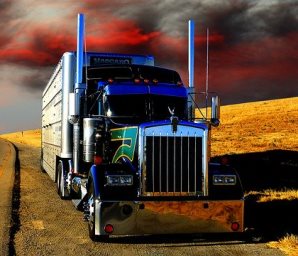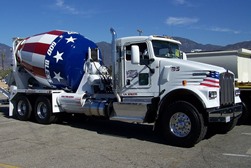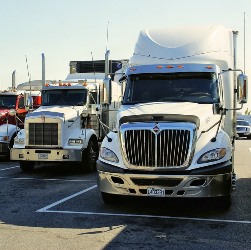How to Choose the Right Trucking School near San Francisco California
 Congratulations on your decision to become a trucker and enroll in a CDL school near San Francisco CA. Maybe it has always been your goal to hit the open highway while operating a huge tractor trailer. Or perhaps you have done some research and have found that an occupation as a truck driver offers good pay and flexible job prospects. Whatever your reason is, it's essential to obtain the proper training by selecting the right CDL school in your area. When assessing your options, there are a number of variables that you'll want to think about prior to making your ultimate selection. Location will no doubt be important, particularly if you have to commute from your San Francisco home. The cost will also be of importance, but choosing a school based solely on price is not the ideal way to guarantee you'll receive the appropriate education. Just remember, your goal is to master the knowledge and skills that will enable you to pass the CDL exams and become a qualified truck driver. So keeping that purpose in mind, just how do you decide on a truck driving school? That is what we are going to discuss in the rest of this article. But first, we are going to talk a little bit about which commercial driver's license you will ultimately need.
Congratulations on your decision to become a trucker and enroll in a CDL school near San Francisco CA. Maybe it has always been your goal to hit the open highway while operating a huge tractor trailer. Or perhaps you have done some research and have found that an occupation as a truck driver offers good pay and flexible job prospects. Whatever your reason is, it's essential to obtain the proper training by selecting the right CDL school in your area. When assessing your options, there are a number of variables that you'll want to think about prior to making your ultimate selection. Location will no doubt be important, particularly if you have to commute from your San Francisco home. The cost will also be of importance, but choosing a school based solely on price is not the ideal way to guarantee you'll receive the appropriate education. Just remember, your goal is to master the knowledge and skills that will enable you to pass the CDL exams and become a qualified truck driver. So keeping that purpose in mind, just how do you decide on a truck driving school? That is what we are going to discuss in the rest of this article. But first, we are going to talk a little bit about which commercial driver's license you will ultimately need.
Which CDL Is Required?

To drive commercial vehicles lawfully within the USA and San Francisco CA, a driver must attain a CDL (Commercial Driver's License). The 3 classes of licenses that a driver can apply for are Class A, Class B and Class C. Since the topic of this article is how to choose a truck driver school, we will focus on Class A and Class B licenses. What distinguishes each class of CDL is the type of vehicle that the driver can operate as well as the GVWR (Gross Vehicle Weight Rating) or GCWR (Gross Combination Weight Rating). Below are short explanations of the two classes.
Class A CDL. A Class A Commercial Drivers License is required to drive any vehicle that has a GCWR of greater than 26,000 lbs., including a towed vehicle of greater than 10,000 lbs. A few of the vehicles that drivers may be able to operate with Class A licenses are:
- Interstate or Intrastate Tractor Trailers
- Trucks with Double or Triple Trailers
- Tanker Trucks
- Livestock Carriers
- Class B and Class C Vehicles
Class B CDL. A Class B Commercial Drivers License is required to operate single vehicles having a GVWR of more than 26,000 lbs., or a GCWR of greater than 26,000 lbs. including a towed vehicle weighing up to 10,000 lbs. Some of the vehicles that drivers may be qualified to operate with Class B licenses are:
- Tractor Trailers
- Dump Trucks
- Cement Mixers
- Large Buses
- Class C Vehicles
Both Class A and Class B Commercial Drivers Licenses might also require endorsements to drive specific kinds of vehicles, including school or passenger buses. And a Class A licensee, with the appropriate needed endorsements, can operate any vehicle that a Class B licensee is authorized to operate.
How to Research a Trucker School

When you have determined which CDL you wish to pursue, you can start the process of evaluating the San Francisco CA truck driving schools that you are looking at. As already mentioned, cost and location will no doubt be your initial concerns. But it can't be stressed enough that they must not be your sole considerations. Other issues, including the reputations of the schools or the experience of the instructors are similarly if not more important. So following are some additional things that you should research while carrying out your due diligence prior to enrolling in, and particularly paying for, your truck driver training.
Are the Schools Accredited or Certified ? Not many trucking schools in the San Francisco CA area are accredited due to the rigorous process and expense to the schools. On the other hand, certification is more common and is offered by the Professional Truck Driver Institute (PTDI). A school is not obligated to become certified, but there are a number of advantages. Interested students know that the training will be of the highest caliber, and that they will get plenty of driving time. For example, PTDI requires 44 hours of actual driving time, not ride-alongs or simulations. So if a school's program is certified (the program, not the school is certified), students know that the training and curriculum will fulfill the very high standards set by PTDI.
How Long in Business? One clue to help assess the quality of a trucking school is how long it has been in operation. A negatively reviewed or a fly by night school typically will not be in business very long, so longevity is a plus. Having said that, even the top San Francisco CA schools had to begin from their opening day of training, so use it as one of multiple qualifications. You can also ask what the school's track record is relating to successful licensing and employment of its graduating students. If a school won't provide those stats, look elsewhere. The schools should also maintain associations with local and national trucking firms. Having a large number of contacts not only confirms an excellent reputation within the profession, but also bolsters their job placement program for students. It also wouldn't hurt to contact the California licensing authority to verify that the CDL trucker schools you are reviewing are in compliance.
How Effective is the Training? As a minimum requirement, the schools should be licensed in California and hire instructors that are trained and experienced. We will cover more about the teachers in the following segment. Also, the student to instructor proportion should be no higher than 4 to 1. If it's any greater, then students will not be obtaining the individual attention they will need. This is especially true concerning the one-on-one instruction for behind the wheel training. And watch out for any school that professes it can train you to be a truck driver in a comparatively short period of time. Learning to be an operator and to drive a tractor trailer skillfully takes time. Most San Francisco CA schools provide training programs that range from 3 weeks to as long as 2 months, based on the class of license or kind of vehicle.
How Good are the Instructors? As already stated, it's essential that the instructors are trained to teach driving techniques and experienced as both instructors and drivers. Although several states have minimum driving time criteria to be certified as an instructor, the more professional driving experience a teacher has the better. It's also important that the teachers keep current with industry advancements or any new laws or changes in regulations. Evaluating instructors may be a bit more subjective than other standards, and perhaps the ideal approach is to pay a visit to the school and talk to the instructors in person. You can also speak with some of the students completing the training and find out if they are happy with the quality of instruction and the teacher's qualification to train them.
Sufficient Driving Time? Most importantly, a great trucking school will furnish lots of driving time to its students. Besides, isn't that what it's all about? Driving time is the actual time spent behind the wheel driving a truck. While the use of ride-a-longs with other students and simulators are important training methods, they are no substitute for real driving. The more instruction that a student gets behind the wheel, the better driver he or she will become. And even though driving time can vary among schools, a good benchmark is a minimum of 32 hours. If the school is PTDI certified, it will furnish at least 44 hours of driving time. Contact the San Francisco CA schools you are researching and find out how much driving time they furnish.
Are they Captive or Independent ? You can receive discounted or even free training from some truck driving schools if you make a commitment to be a driver for a particular carrier for a defined period of time. This is called contract training, and the schools that offer it are called captives. So rather than maintaining affiliations with a wide range of trucking lines that they can refer their students to, captives only refer to one company. The tradeoff is receiving less expensive or even free training by surrendering the flexibility to initially work wherever you have an opportunity. Clearly contract training has the potential to reduce your income opportunities when starting out. But for some it may be the ideal way to receive affordable training. Just remember to inquire if the San Francisco CA schools you are looking at are independent or captive so that you can make an informed decision.
Is there CDL Testing Onsite? There are some states that will permit 3rd party CDL testing onsite of truck driver schools for its graduates. If onsite testing is available in California, find out if the schools you are reviewing are DMV certified to offer it. One advantage is that it is more convenient than competing with graduates from other schools for test times at California testing centers. It is moreover an indicator that the DMV considers the approved schools to be of a higher quality.
Are the Class Times Flexible? As formerly noted, CDL training is just one to two months long. With such a short duration, it's imperative that the San Francisco CA school you enroll in offers flexibility for both the curriculum and the scheduling of classes. As an example, if you're having a hard time learning a particular driving maneuver, then the instructor should be willing to spend more time with you until you are proficient. And if you're still holding a job while going to training, then the class scheduling needs to be flexible enough to fit in working hours or other obligations.
Is Job Placement Offered? As soon as you have attained your commercial driver's license after graduating from truck driver school, you will be keen to begin your new career. Verify that the schools you are reviewing have job placement programs. Ask what their job placement ratio is and what average salary their grads start at. Also, ask which national and local trucking firms their graduates are referred to for employment. If a school has a low job placement rate or not many San Francisco CA employers hiring their graduates, it might be a sign to look elsewhere.
Is Financial Assistance Offered? Truck driving schools are comparable to colleges and other San Francisco CA area vocational or trade schools when it comes to loans and other forms of financial aid being offered. Ask if the schools you are examining have a financial assistance department, or at a minimum someone who can help you understand the options and forms that need to be submitted.
Learn More About San Francisco CDL Schools
Choose the Right San Francisco CA CDL Driver Training
Picking the ideal trucking school is an essential first step to beginning your new occupation as a local or long distance truck driver. The skills that you will learn at school will be those that forge a new career behind the wheel. There are a number of options offered and understanding them is critical if you are going to succeed as an operator. But first and foremost, you must get the proper training in order to drive a large commercial vehicle in a professional and safe fashion. If you are short on money or financing, you may want to think about a captive school. You will pay a lower or even no tuition in exchange for driving for their contracted carrier. Or you can select an independent CDL school and have the option of driving for the trucking company of your choice, or one of many affiliated with the school. It's your choice. But no matter how you receive your training, you will in the near future be joining a profession that helps our country move as a professional truck driver in San Francisco CA.
